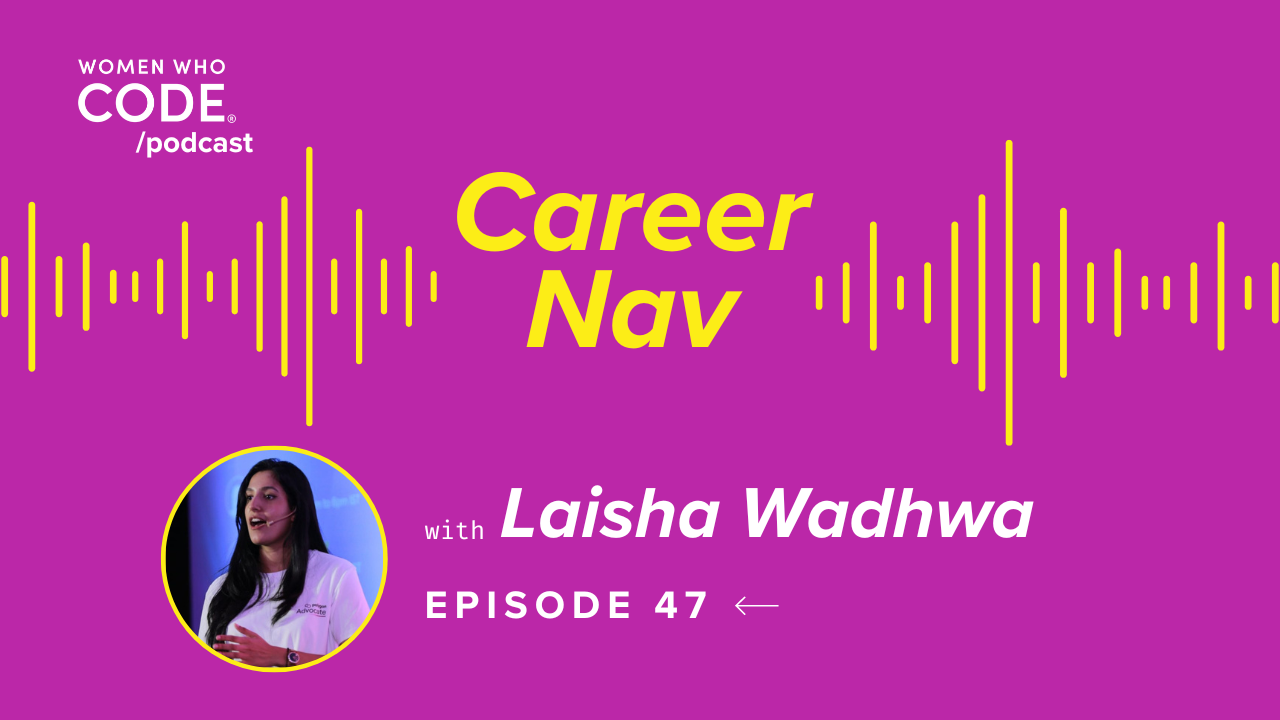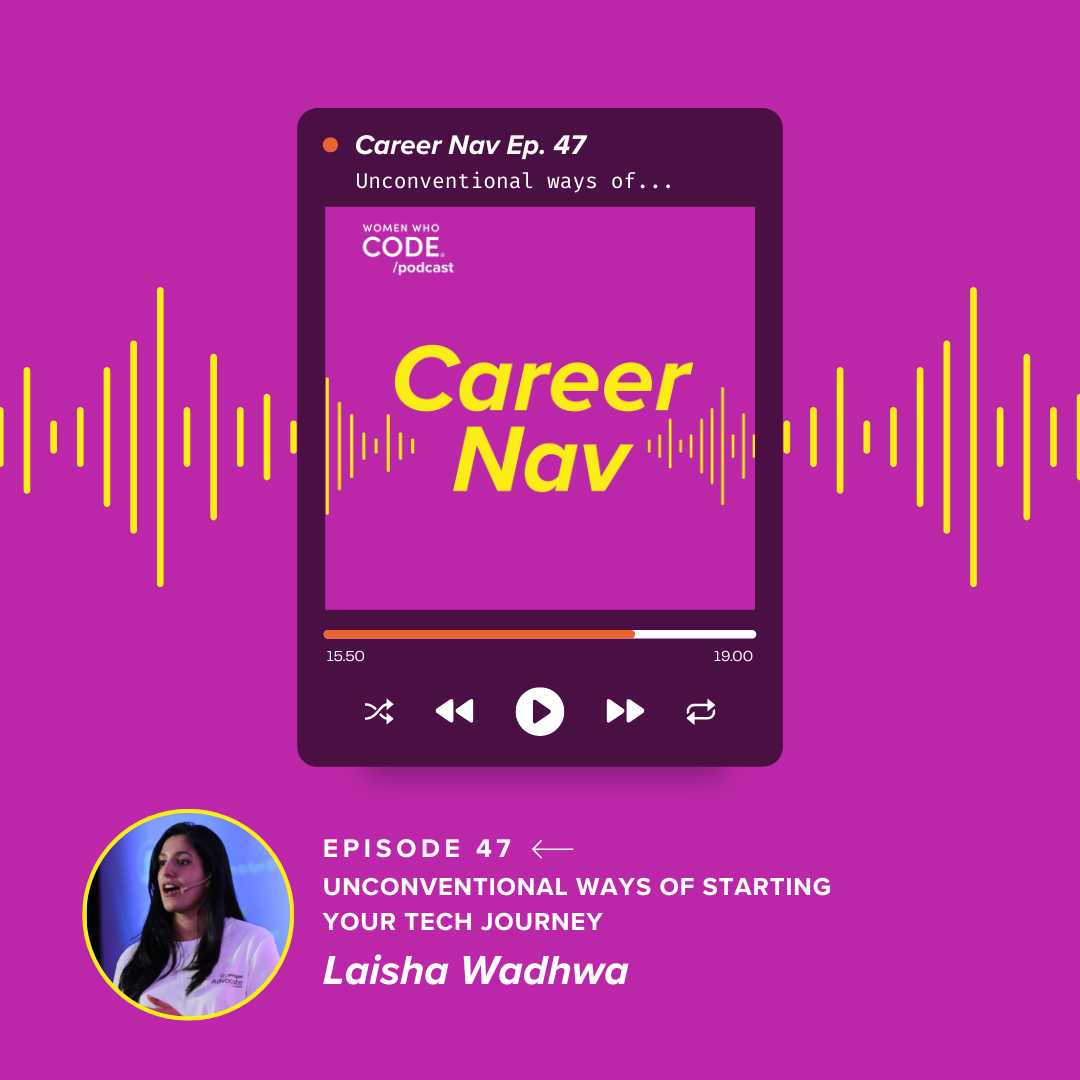Career Nav #47: Unconventional Ways of Starting Your Tech Journey
Written by Laisha Wadhwa

Women Who Code Career Nav 47 | Spotify – iTunes – Google – YouTube – Text
Natalia Daies, Senior Director of Communications & Marketing, Women Who Code, interviews Laisha Wadhwa, Senior Software Engineer, Goldman Sachs. They discuss unconventional ways of starting your tech journey. Laisha shares her experiences and views on hackathons and public speaking and how they can advance your career.
How did you first become interested in technology and share the unconventional ways you’ve advanced your career?
My inclination toward technology started back in high school. That was the first time I built a website. I got a Bachelor of Technology in Computer Science. While I was in college, I felt that I had time to try different things. I tried web development, AI, deep learning, robotics, human-computer interaction, VR, and AR. I gave everything a good try so that I could understand what works for me. You should try different things and see what works for you, what is your passion, and what is driving you. For me, that was machine learning.
The Microsoft Hackathon was my first national hackathon. I went all in without knowing anything about hackathons or machine learning. I had a deadline. I had to learn. I had to experiment and brainstorm. I won the hackathon. I learned so much, which paved the way for me to start attending events more. That also gave me a lot of opportunities to network.
In my sophomore year, I started doing internships. I interned at a gaming company, then a data science firm. I think the connections I built through these events came in very handy to crack those internships, make those connections, and work on projects which were making some sort of impact. These things paved the way for me to venture into this whole space and publish some research papers in my early years of college. I moved up the ladder, and now I’m working as a Senior Software Engineer. I still feel that one should never lose the spirit to build.
What is the value behind doing more boot camps and hackathons?
With a lot of AI-related features coming up, it has become easy for people to use technology. If someone wanted to switch fields within technology, I would really start looking at opportunities to get upskilled. You can also connect and network at events with people in that field. When I was participating in hackathons and going to these events, I made it a point to anything I worked on, I put it on my GitHub and wrote a blog around it on Medium. That created proof of work, so when you potentially want to start a career in that field, you have a record. People move into and out of tech very quickly now. I think the most significant part of that is the kind of network people are able to build, either online or offline.
Are there other sites that you think new technologists, people who have been in the field for years should absolutely be on to build their brand?
LinkedIn and Twitter will help you connect with like-minded people and build a network for yourself. Tech Twitter is great. The resources are amazing. When it comes to blogging, people feel they need to be good at writing, but that’s not the case. There are multiple tech blogs, though Medium is one. People also prefer starting their own blogs either on WordPress or an independent website, so you could also do that.
Can you speak a little bit about the importance of public speaking and give some advice for technologists who may be a bit more introverted?
The benefits are multifaceted. When you put yourself out in the world, when you talk about something, you’re going to learn a lot from the people whom you are addressing. You’re not just imparting knowledge, but you’re also gaining back a lot of knowledge. The second thing is that presenting something in a public setting opens a lot of horizons for you in terms of networking, sharing your knowledge, and sharing your work. It helps you build a great personal brand for yourself. Public speaking as a platform enables you to bring yourself closer to the community.
What advice would you give someone who has taken an unconventional route for interviewing and showcasing their knowledge and expertise beyond public speaking? What should they be preparing when they’re looking at roles if they haven’t taken a traditional route?
When you’re going on the untraditional route, you need to have proof that you are capable. From a traditional route, education does that for us. When you’re going out there on the basis of your skill, you should have a good portfolio of projects in whichever field you want to go into. If you’re a full-stack developer, you should have good full-stack apps that you can demo. In terms of machine learning and AI, you should have a good portfolio of projects that demonstrate the kind of understanding you have. Try to keep it diverse.
Another thing I feel that is important is that a lot of the time, when people focus on building projects, they sometimes lose the essence of their fundamentals in terms of technology. It could be in terms of any computer language that you are practicing, so be very clear there because those are the bases on which you’ll be building the foundation of anything and any company that you work for.
Can you share your thoughts on ethics in AI and what that means for you in the tech industry?
AI doesn’t always learn what we want it to learn. It happens more often than not because, at the end of the day, nobody is checking. When we are building models at a massive scale, then those checks happen. When we are looking at small applications within our apps, we don’t understand what it’s actually learning. I think it boils down to the kind of data that is being consumed by AI. I’m a big advocate for data privacy. That’s why I’m very inclined to Web3, a web trying to change that whole dynamic.
The kind of data you’re going to give to your AI is the way it’s going to respond. Since we are moving towards an era where models are getting more complex than a human brain, I can’t even comprehend what the AI might learn. It boils down to the kind of data you’re feeding your AI. It is going to learn things differently. We are at that juncture where ethical AI and transparent AI are really important. People should be more conscious of the kind of data that is getting exposed to all of these algorithms that are running. I think pretty much any application that we use today uses our data and AI on top of it, either to give us a recommendation or to improve our user experience. That’s great, but a lot of privacy breaches happen in that entire process. I would love to see a web where we can do away with that.
How can AI and machine learning or the tech industry create change or be used for social good?
During COVID times 2019, our health systems were crumbling. I have seen some innovative solutions that came out to the front line. They were using AI to increase the speed with which diagnosis was happening. Qure.ai is a company that will give you AI-based diagnostics of your X-ray, CT scans, and a bunch of other things. I think there are similar advancements in the cancer space, where people are using AI to identify benign or malignant cancers. AI itself cannot replace a doctor. It acts as a helping hand for the doctor to make a wiser decision than they would have alone. Think of AI as a group of expert surgeons assisting you in deciding.
AI is a superpower that guides you to make more informed decisions. AI has also come up a lot in the AR and VR space where it is used for training, in terms of surgery and testing. It’s a simulation to understand the success rates of complex surgeries to build better advancements. There are also places where AI robots have done very complex surgeries in half the time that a doctor would have taken and with higher precision. With the advancement of AI, I think we’ll be able to cater to more problems and offer solutions to a wider population. AI is not just something that is solving regular diagnostic issues, but it is also solving a lot of social good initiatives as well.
Will you share more about how hackathons have helped you grow in your career and build your platform?
Hackathons were the place where I fell in love with the building. I was passionate about technology. I wanted to try my hands at different things, but when I went to my first hackathon, I realized that building is so much fun. I learned everything during a hackathon. It was not just the technology. I learned time management, product management, team building, and everything around it. When you build something from scratch and you see it right in front of you, working end-to-end, you get the essence that you’ve built something. You have accomplished something, and the kind of joy you’ll get out of doing such fun things, I think that’s unparalleled. Online hackathons are beneficial because you connect with a broad group of people. You get to explore a lot of new technologies. I think you will learn faster in a hackathon than you would ever be able to learn in your regular workstream. A vast pool of opportunities is waiting for you to come, tap its potential and take whatever you can from it.
Is there anything else you would share with technologists who have not had the opportunity to begin building in public or are just getting started and don’t know where to begin?
You might feel too naive to put whatever you’re building out there. Everybody will have a unique approach to how they would solve a problem. That is what is going to help you take that journey of learning. Once you start writing about what you’re building, you will also talk about certain challenges that you run into. When you talk about all of this, and put it out in public, the community will reach out to you and tell you how you can improve it. That kind of advice came in very handy for me. When I started building things and trying my hands with new technologies, I didn’t have good resources. It also becomes like an accountability meter for you to come back, do it, finish it, and then put out something you’re proud of building.
What is the importance of allowing yourself to fail as you grow in tech?
I think with awareness. You have more room to fail because you know that even if you fail, you can take an alternative path to reach your goal. Then it’s more about focusing on the process than just the destination.
Any final wisdom that you would give that you think is important for people to know as they’re either pivoting into tech, starting out or maybe they’re in college and they’re just trying to get their footing?
Have self-confidence. You never know what opportunity might strike you. You might make it, and that will change the way your journey will progress or the kind of career you will build for yourself. You don’t have to do all of these things alone. Find a mentor. People are very helpful. Reach out to the community.
***************
Guest: Laisha Wadhwa, Senior Software Engineer, Goldman Sachs
Host: Natalia Daies, Senior Director of Communications & Marketing
Producer: JL Lewitin, Senior Producer, Press and Digital Content, Women Who Code
